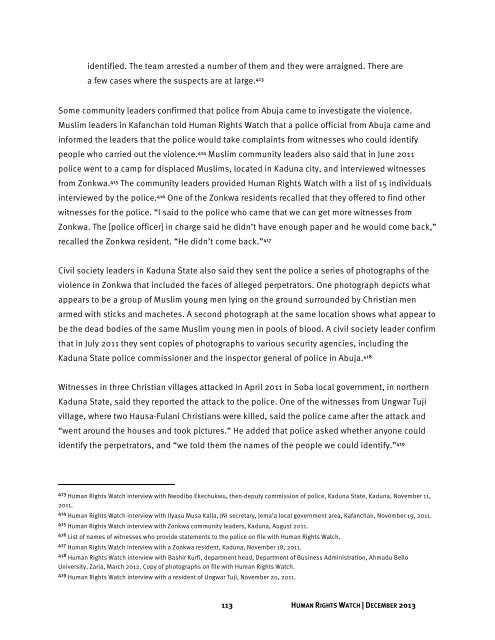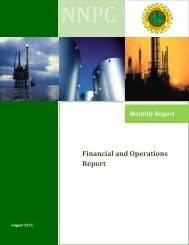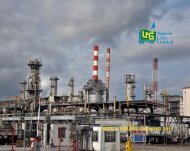You also want an ePaper? Increase the reach of your titles
YUMPU automatically turns print PDFs into web optimized ePapers that Google loves.
identified. The team arrested a number of them and they were arraigned. There are<br />
a few cases where the suspects are at large. 413<br />
Some community leaders confirmed that police from Abuja came to investigate the violence.<br />
Muslim leaders in Kafanchan told Human Rights Watch that a police official from Abuja came and<br />
informed the leaders that the police would take complaints from witnesses who could identify<br />
people who carried out the violence. 414 Muslim community leaders also said that in June 2011<br />
police went to a camp for displaced Muslims, located in Kaduna city, and interviewed witnesses<br />
from Zonkwa. 415 The community leaders provided Human Rights Watch with a list of 15 individuals<br />
interviewed by the police. 416 One of the Zonkwa residents recalled that they offered to find other<br />
witnesses for the police. “I said to the police who came that we can get more witnesses from<br />
Zonkwa. The [police officer] in charge said he didn’t have enough paper and he would come back,”<br />
recalled the Zonkwa resident. “He didn’t come back.” 417<br />
Civil society leaders in Kaduna State also said they sent the police a series of photographs of the<br />
violence in Zonkwa that included the faces of alleged perpetrators. One photograph depicts what<br />
appears to be a group of Muslim young men lying on the ground surrounded by Christian men<br />
armed with sticks and machetes. A second photograph at the same location shows what appear to<br />
be the dead bodies of the same Muslim young men in pools of blood. A civil society leader confirm<br />
that in July 2011 they sent copies of photographs to various security agencies, including the<br />
Kaduna State police commissioner and the inspector general of police in Abuja. 418<br />
Witnesses in three Christian villages attacked in April 2011 in Soba local government, in northern<br />
Kaduna State, said they reported the attack to the police. One of the witnesses from Ungwar Tuji<br />
village, where two Hausa-Fulani Christians were killed, said the police came after the attack and<br />
“went around the houses and took pictures.” He added that police asked whether anyone could<br />
identify the perpetrators, and “we told them the names of the people we could identify.” 419<br />
413 Human Rights Watch interview with Nwodibo Ekechukwu, then-deputy commission of police, Kaduna State, Kaduna, November 11,<br />
2011.<br />
414 Human Rights Watch interview with Ilyasu Musa Kalla, JNI secretary, Jema’a local government area, Kafanchan, November 19, 2011.<br />
415 Human Rights Watch interview with Zonkwa community leaders, Kaduna, August 2011.<br />
416 List of names of witnesses who provide statements to the police on file with Human Rights Watch.<br />
417 Human Rights Watch interview with a Zonkwa resident, Kaduna, November 18, 2011.<br />
418 Human Rights Watch interview with Bashir Kurfi, department head, Department of Business Administration, Ahmadu Bello<br />
University, Zaria, March 2012. Copy of photographs on file with Human Rights Watch.<br />
419 Human Rights Watch interview with a resident of Ungwar Tuji, November 20, 2011.<br />
113 HUMAN RIGHTS WATCH | DECEMBER 2013




